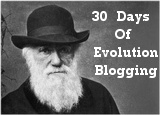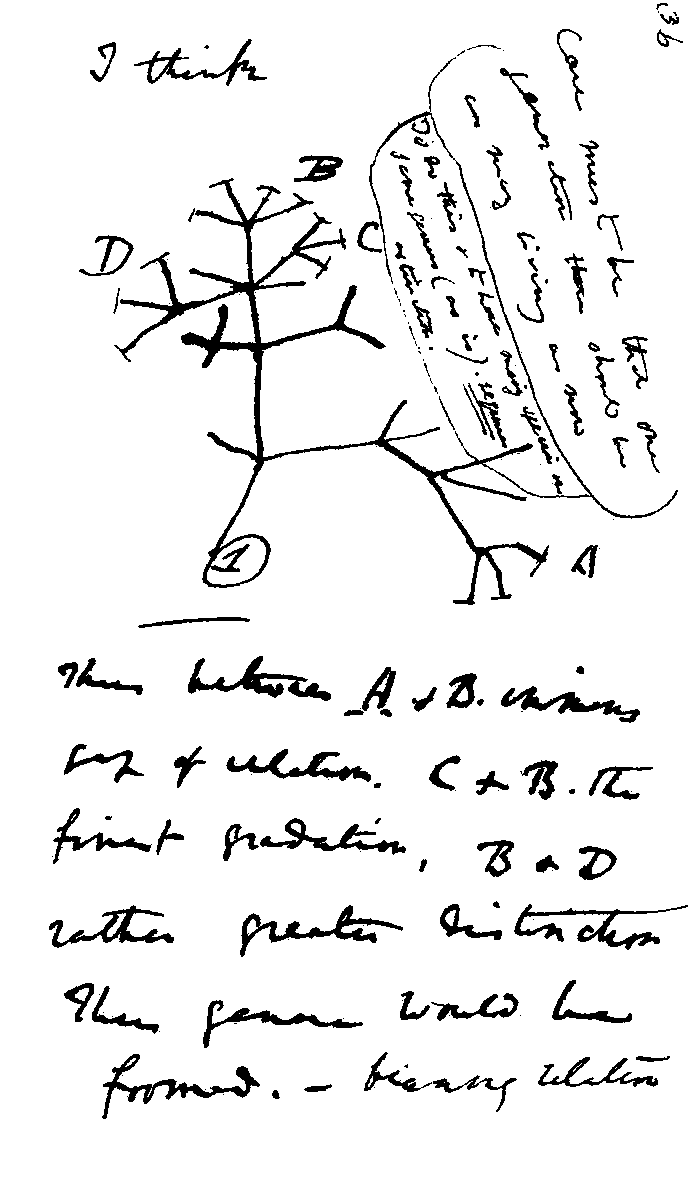
Show Me The Science Month Day 19
Merriam-Webster's dictionary says the word 'evolution' originated in 1622 and derives from the Latin evolutio, "unrolling, from", as in a parchment, and this is actually the perfect way to think of both Darwin and Evolution in their context.
Pedantics will note that Darwin used the word 'evolved' and not 'evolution' in Origin of Species, which seems a little picayune - there are good reasons he did not use it and only popular context demanded he include it by the sixth volume of Origin of Species, though he clearly preferred "descent with modification."
In a biological development (ontogeny) setting, the word evolution was first used in 1762 by Charles Bonnet in Considerations sur les Corps Organises but he was a 'preformationist' and used it in opposition to 'epigenesis' - he felt that the human embryo was formed before conception (homunculus theory) and what followed afterward was the growth of a pre-existing 'germ.' We grew, rolled out, 'evolved', from that germ. Even later, when it took on a primarily biological context, European philosophers held on to that version of evolution as well. Leibniz called the 'germ of man' monads and both Kant and Hegel would continue with the idea, evolution as an orderly sequence of events - like those car ads today that say they are the 'evolution of automobile engineering.'
The word apparently retained enough of that preformation stigma that Jean-Baptiste Lamarck had no use for it in his 1809 work, Philosophie Zoologique, so it is no surprise that Darwin would not choose to use it either, though now it is virtually synonymous with him.
It fell to Herbert Spencer to strip the word of its metaphysical aura and use it in a scientific setting. He first mentions it in 1851, in Social Statics, but he apparently thinks it's well known enough that he doesn't bother to define it, though he knows what he's getting at when he writes "civilisation no longer appears to be a regular unfolding after a specific plan; but seems rather a development of man's latent abilities under the action of favourable circumstances" (p. 415).
By 1862, three years after On The Origin Of Species, Spencer wrote in First Principles, "Evolution is a change from an indefinite, incoherent homogeneity, to a definite, coherent heterogeneity; through continuous differentiations and integrations."
Spencer understood complexity, though not adaptive complexity - it took a Darwin to put all that together and make evolution the central organizing principle that biologists use to understand the world.
You're probably recognizing that a great deal of the thinking pre-Darwin was teleological - and that is true, which is why natural selection in evolution met so much resistance. The concept of a plan or a predetermined goal is certainly a lot more comforting - adaptation to a local environment doesn't play well with a cosmic grand scheme (or a divine Creator) - but variation was not simply 'random', it was just possible to go in multiple directions. Adaptive evolution was open ended. A branching tree:

Yes, species were not fixed, they were just populations with varying components - and no limit on the variation. In the evolution of evolution, Darwin - a great thinker - synthesized a great many things that he learned with what he knew from his studies and from discussions inspired by fellow scientists.
Of course, he didn't know anything about genetic mutations but the unification of Darwin and Mendel - the modern evolutionary synthesis of the 1920s and '30s - would be the validation that natural selection needed to be the bedrock of evolution as we know it today.
A number of people were obviously uncomfortable with the notion that least fit variations would be eliminated and some incorrectly came to believe that meant it was a world of "survival of the fittest" - another term attributed to Herbert Spencer who was, for someone who had such impact on the language of biology, not a biologist at all.
But the evolution of that 'survival of the fittest' phrase and the 'social Darwinism' it brought is an article for another time.





Comments